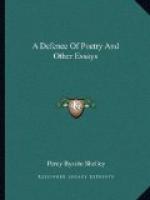Secondly,—Persons of energetic character, in communities not modelled with philosophical skill to turn all the energies which they contain to the purposes of common good, are prone also to fall into the temptation of undertaking, and are peculiarly fitted for despising the perils attendant upon consummating, the most enormous crimes. Murder, rapes, extensive schemes of plunder are the actions of persons belonging to this class; and death is the penalty of conviction. But the coarseness of organization, peculiar to men capable of committing acts wholly selfish, is usually found to be associated with a proportionate insensibility to fear or pain. Their sufferings communicate to those of the spectators, who may be liable to the commission of similar crimes a sense of the lightness of that event, when closely examined which, at a distance, as uneducated persons are accustomed to do, probably they regarded with horror. But a great majority of the spectators are so bound up in the interests and the habits of social union that no temptation would be sufficiently strong to induce them to a commission of the enormities to which this penalty is assigned. The more powerful, and the richer among them,—and a numerous class of little tradesmen are richer and more powerful than those who are employed by them, and the employer, in general, bears this relation to the employed,—regard their own wrongs as, in some degree, avenged, and their own rights secured by this punishment, inflicted as the penalty of whatever crime. In cases of murder or mutilation, this feeling is almost universal. In those, therefore, whom this exhibition does not awaken to the sympathy which extenuates crime and discredits the law which restrains it, it produces feelings more directly at war with the genuine purposes of political society. It excites those emotions which it is the chief object of civilization to extinguish for ever, and in the extinction of which alone there can be any hope of better institutions than those under which men now




